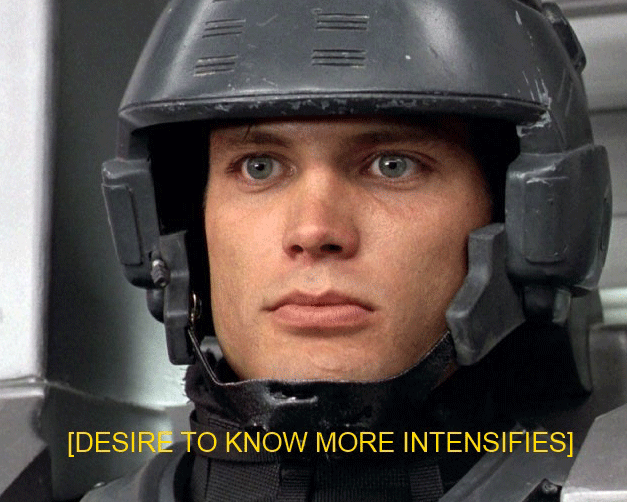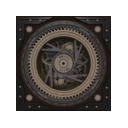Encyclopedia Britannica was the answer.
All you needed to do was get up off your arse, travel to a library, (business hours only), and dig through a card catalog for outdated information on the subject you were interested in. Bonus difficulty: Needing to wait a week for your library to get the outdated book you needed because it was in a different town.
Today all information is available at any time-- 24/7365. Bonus difficulty: Sorting through all the AI bullshit to glean the correct information on a subject you know very little about.
Don’t you know the Dewey decimal system?

How to say you’re young without saying you’re young, lol. Some people, boomers even, remember a time before Google existed and people used other search engines.
I’d askjeeves all sorts of things. Or hotbot. Or yahoo. I think MSN even had one. I think the term Google is the same as Bandaid at this point, and synonymous with Internet search.
I appreciate the sentiment though. Did many research papers in school where it was go to library, get books, quote them, place citation in bibliography. I enter high school in 2001 and Wikipedia is a thing, and that was that. We had been “allowed” to cite websites at that point, and while Wikipedia was off limits, some of us would just jump down the wiki article to it’s citations and use those.
But yeah, I remember the days of writing papers in a library, that or using Encarta. Encyclopedia Brittanica or Encarta.
And before that we had tiny wikipedia’s written on paper.
Or you could ask that one friend
Thinking that people couldn’t find things out before google is naive and just sets you up to believe whatever shit google tells you.
Getting misinformation from the internet is worse than not being able to find the information, and far worse than getting valid information you have to look up in a book/publication.
I think there used to be a kind of mystery about things though, you could debate in a pub for hours on a subject where now there’s a definitive answer available within seconds. That delay in accessing information was fun and led to all sorts of debates and wonder. I remember when the original Pokémon games came out on Gameboy and there were all sorts of rumours flying around about how to get certain Pokémon, missingno etc. you never knew what was real or not until you saw it with your own eyes. Now you go on Google/YouTube and someone’s already done an hour long deep dive to prove/debunk everything. I think having all of this information at our fingertips has actually stunted our curiosity and drive to explore and experiment
How about the misinformation from Uncle Mike who overheard your question and confidently spews you some bullshit? If it’s not in the encyclopedia upstairs, most of the questions that cross your mind went unanswered or you took everyone at their word.
Sure, you write down important questions and topics, but this post doesn’t seem to be about that.
Yeah this post is a joke and you’re supposed to chuckle at it, but in Lemmy fashion, here we are dissecting the shit out of it. But hey, it’s about discussion, I guess, and I’m certainly a part of it.
Yes and no, it was always technically possible to drive thirty minutes a way go to a library, find a book that hopefully has what you want in it, drive back read it over a weekend, drive back to the library drop off the book, return and waist ~3hrs of your life to Learn a factoid but the barrier to entry was much higher and esoteric knowledge was simply unobtainable unless you went to university. Radio and TV both helped tremendously but you were more subject to the opinions of the studio and politicians than you are now and you would still have to wait and hope something was relevant to the thing you don’t understand, and even then most entertainment was not educational.
Or you had an encyclopedia and a variety of assorted reference books on your shelf at home. This is not really as much about information technology as it is about laziness and lack of curiosity. The same thing is a widespread phenomenon today, even with the internet.
The problem with those home encyclopedias was they were mostly a decade or more out of date. And only provided a very limited amount of information. Generally only a few paragraphs or a page at best. Reference books suffered the same problems of not being current. Turns out books cost money and knowledge ain’t cheap.
The only reference book that I own that is even remotely up to date is the last Machinery’s Handbook I bought. And even that is multiple issues behind now.
We moved often when I was a kid. Every time we moved to a new city, the first thing my mom did was take us to the library to get us our library cards. We looked forward to each trip to the library, browsing around and picking out books to check out. We weren’t just there to look up a factoid, but we did learn facts about all kinds of subjects and loved reading the stories, so we developed our literacy and spelling skills without even knowing it. The time was well spent and fun, certainly not a waste.
I love being able to quickly look up a factoid online of course but that isn’t a substitute for reading books.
Books be like

I mean, the bar to go get a reference book to look something up is significantly higher than “pull my smartphone out of my pocket and tap a few things in”.
Here’s an article from 1945 on what the future of information access might look like.
https://www.theatlantic.com/past/docs/unbound/flashbks/computer/bushf.htm
The Atlantic Monthly | July 1945
“As We May Think”
by Vannevar Bush
Eighty years ago, the stuff that was science fiction to the people working on the cutting edge of technology looks pretty unremarkable, even absurdly conservative, to us in 2025:
Like dry photography, microphotography still has a long way to go. The basic scheme of reducing the size of the record, and examining it by projection rather than directly, has possibilities too great to be ignored. The combination of optical projection and photographic reduction is already producing some results in microfilm for scholarly purposes, and the potentialities are highly suggestive. Today, with microfilm, reductions by a linear factor of 20 can be employed and still produce full clarity when the material is re-enlarged for examination. The limits are set by the graininess of the film, the excellence of the optical system, and the efficiency of the light sources employed. All of these are rapidly improving.
Assume a linear ratio of 100 for future use. Consider film of the same thickness as paper, although thinner film will certainly be usable. Even under these conditions there would be a total factor of 10,000 between the bulk of the ordinary record on books, and its microfilm replica. The Encyclopoedia Britannica could be reduced to the volume of a matchbox. A library of a million volumes could be compressed into one end of a desk. If the human race has produced since the invention of movable type a total record, in the form of magazines, newspapers, books, tracts, advertising blurbs, correspondence, having a volume corresponding to a billion books, the whole affair, assembled and compressed, could be lugged off in a moving van. Mere compression, of course, is not enough; one needs not only to make and store a record but also be able to consult it, and this aspect of the matter comes later. Even the modern great library is not generally consulted; it is nibbled at by a few.
Compression is important, however, when it comes to costs. The material for the microfilm Britannica would cost a nickel, and it could be mailed anywhere for a cent. What would it cost to print a million copies? To print a sheet of newspaper, in a large edition, costs a small fraction of a cent. The entire material of the Britannica in reduced microfilm form would go on a sheet eight and one-half by eleven inches. Once it is available, with the photographic reproduction methods of the future, duplicates in large quantities could probably be turned out for a cent apiece beyond the cost of materials.
If the user wishes to consult a certain book, he taps its code on the keyboard, and the title page of the book promptly appears before him, projected onto one of his viewing positions. Frequently-used codes are mnemonic, so that he seldom consults his code book; but when he does, a single tap of a key projects it for his use. Moreover, he has supplemental levers. On deflecting one of these levers to the right he runs through the book before him, each page in turn being projected at a speed which just allows a recognizing glance at each. If he deflects it further to the right, he steps through the book 10 pages at a time; still further at 100 pages at a time. Deflection to the left gives him the same control backwards.
A special button transfers him immediately to the first page of the index. Any given book of his library can thus be called up and consulted with far greater facility than if it were taken from a shelf. As he has several projection positions, he can leave one item in position while he calls up another. He can add marginal notes and comments, taking advantage of one possible type of dry photography, and it could even be arranged so that he can do this by a stylus scheme, such as is now employed in the telautograph seen in railroad waiting rooms, just as though he had the physical page before him.
Amusingly, in a way, we are using microphotography (photolithography) to produce images on the scale of hundreds of atoms. Then we stack those images to achieve dense structures of data that can be read out electronically (flash chips).
Making a rom chip using this technology would be a lot like that encyclopedia britannica in a matchbox, except more around the size of a grain of dust. Of course we tend to make ram instead, where information is only encoded after the photolithography is done creating the structure.I’d highly recommend going down to your local library and seeing if they have any microfilm copies of the local paper. It’s kinda fun just scrolling through the years and seeing what people felt was important enough to put to print. A lot of smaller towns used to publish interpersonal gossip. (The Harringtons of 5th Avenue entertained a Mr. Somensuch last Wednesday night.)
They still do. Birthdays and funerals are also fodder for small town print papers.
That’s a neat find!
Well, where would you download them? Or if you’re talking about printed books: where would you order them? See?
Never before has anyone accomplished to make me want to throw a whole library in its entirety at them, including the building. Good job.
Glad to be of service!
My town library was ridiculously small. Not everyone has the same opportunities.
But we do used books anyway, they were usually the encyclopedia, the dictionary, and text books.
This tip probably isn’t useful to you today, but in many library systems you can request a book at your local library and they will deliver it to you from some other branch that has a copy of it
Back in the very early 90’s I had a salesman from Britannica show up on my doorstep. I was amenable and ended up buying a set of encyclopedias. I loved them partially because I love books, but I also loved that I had all this information at the ready even if frozen in the time when they were printed.
Now we have the internet and it’s nice and all, but I wish I still had those books.
I grew up in a household with the Encyclopedia Britannica (and some kind of a German version of it) and at some point I and my father would look who’s faster, me on my smartphone or he with his books. For newer tropics, he didn’t stand a chance.
The Britannica was one of those essential things for every home. It was like having a home computer. It contained as complete a collection of human knowledge that was possible without a full-blown library.
I remember in the 90s looking through them trying to answer a random question I had and then later on going to the library to check out more research material if the Brittanica didn’t satisfy my curiosity.
As great as the internet is, I miss running a finger across the tomes to learn something new about the world.
I feel like every house I was in had a set of encyclopedias, and a copy of “The Way Things Work”. I’m kinda ashamed I have neither in my house today.
This thread is making me want to buy an encyclopedia set.
Just checked, $1,500-2,000 for the Encyclopedia Brittanica, no longer in print. Most recent edition is from 2010…
I guess I’ll just put wikipedia on an e-reader…
Your local library is free, and i would guess they have paper encyclopedias
We had a set of encyclopedias at home when I was a kid and also one called Childcraft that was written for kids. They were great. I spent a lot of time browsing and reading them.
Not quiet an encyclopedia, but as a child I really liked The Top 10 of Everything books.
This was late the late 90s, we had dial-up, but internet was still in its infancy.
I definitely had the 1999 and 1998 editions:


Microsoft Encarta was also mind-blowing for its time, especially if your were a child in the late 90s and early 2000s.
IIRC, they no longer print it, but you can probably buy used collections.
kagis
Yeah. The final print edition was 2010:
https://en.wikipedia.org/wiki/Encyclopædia_Britannica
The Encyclopædia Britannica (Latin for ‘British Encyclopaedia’) is a general-knowledge English-language encyclopaedia. It has been published by Encyclopædia Britannica, Inc. since 1768, although the company has changed ownership seven times. The 2010 version of the 15th edition, which spans 32 volumes[1] and 32,640 pages, was the last printed edition. Since 2016, it has been published exclusively as an online encyclopaedia at the website Britannica.com
Printed for 244 years, the Britannica was the longest-running in-print encyclopaedia in the English language. It was first published between 1768 and 1771 in Edinburgh, Scotland, in three volumes.
Copyright (well, under US law, and I assume elsewhere) also doesn’t restrict actually making copies, but distributing those copies. If you want to print out a hard copy of the entire Encyclopedia Britannica website for your own use in the event of Armageddon, I imagine that there’s probably software that will let you do that.
Thanks, I do recall when they announced the last printing. Book collections can get cumbersome things to haul around in our lives and I have many already. If I ran across a more current set maybe I’d bite, but I won’t chase them down. I did already acquire the set of Great Books (classic literature and philosophy collection) that my father bought and dragged around. I’ve read some of the authors, but if I’m being honest I’d admit the 54 volumes are now mostly decorative in function and do look nice up on the shelf. I won’t get rid of them as I see their value, but that also means I have the opportunity to move them…again.
Have you not ever been to a library?
Librarians are the best people to talk to about finding information about where and what is available for you to learn more.
Seriously get to a library and talk to them, they are wonderful.
That’s true! I’m married to a librarian and she’d love to help you find information!
But in the 80’s she’d help you find the sentence about your topic in the World Book. And put your name on the list for the book they had about the topic that’s been overdue for a year and a half.
Encyclopedia?
Every book on gender identity and women’s rights?
(You know, the ones that conservatives keep trying to ban/burn)
Yeah, but then you’ve got to go to a library, which is great and all, but you might not get to that during the commercial break.
Well they do have shows, movies and documentaries available for checkout; so you can avoid all commercials and get more of the content that you love.
Motion to change it to “before Wikipedia”, since that’s not evil
Wikipedia is way better for learning shit than google anyway.
Especially lately
Or just “the internet”
I definitely notice that wonder has died with a lot of people. Luckily I try to be a luddite and enjoy life without tech as well as with. Still have tons of books. Shut the internet off every so often.
I seemed to have no issue back in the day finding what I needed. Just not as easy.
Yeah, this has nothing to do with the internet. It is just about lazy vs. not lazy. The exact same scenario happens today, despite the internet.
Honestly though, you could never be certain how accurate it was. You could be certain it was probably several years out of date.
Same as the internet then.
Well, lately
My parents got my sisters and
Ime the digital Encyclopedia Britannica and purchased any available updates. Pretty fucking sweet, looking back on it.
Meanwhile in 2025:
- User: ChatGPT, tell me about $OBSCURE_TOPIC.
- ChatGPT: Sure, I will explain. You see, $CONFIDENT_EXPOSITION.
- User: Hmmm. That doesn’t feel quite right, but I’m too lazy too fact check it. That’ll do.
We’re back to the confident misinformation that someone gave when asked about something they didn’t know about. Only with more racism and less critical thinking/questioning
I think you mean
-User: Okay repeats this as if it’s now fact because the computer said so
Most people don’t seem to be even capable of questioning the shit answer the AI gives them
life in 2025 💥😵💫😵💀👻🔁
I remember they used to have door-to-door encyclopedia salesmen. Thinking back on it, we had book stores back then, so people could have gotten encyclopedias from there, so how did encyclopedia salesmen make any sales??
At any rate, at some point, my parents had purchased a short set of encyclopedias. They weren’t as good as the ones at the school or library, but it was something like 4-5 large books.
And despite what people think today, I don’t think those encyclopedias were as good or as accurate as Wikipedia is today. Wikipedia is so nice. If you want to know more about a part that’s not covered well in the article, you can just go look at the source.
Thinking back on it, we had book stores back then, so people could have gotten encyclopedias from there, so how did encyclopedia salesmen make any sales??
If I recall correctly you couldn’t buy the big encyclopaedias in bookstores (dictionaries and single book encyclopedias, sure, but not the big multiple volume ones), only through their sellers or by phone.
And they often came with a subscription to get new update appendixes and the like.
(Also most of these door to door salespeople probably also carried other products, like subscriptions to magazines and whatnot; and, an average encyclopedia being at least ten volumes, going up to twenty or so, they weren’t cheap, so they didn’t need that many sales.)
Our family had the whole set. At least a dozen books by alphabetical order.
My parents recently got rid of a set of encyclopedias that they’d had in the house since at least the '90s. I don’t actually remember where they came from or exactly when they were suddenly there, but recently they got rid of them (donated to charity) and I was a little offended - not that I said as much - that they didn’t offer them to me.
They weren’t even recent. They were printed in the early ‘50s, but in my parents’ (still) no-Internet house, those encyclopedias were a good pastime.
There are usually several sets of the same available on eBay, but 1) the good sets are a bit out of my price range, 2) I have internet here and 3) I’m already hoarding far too much stuff.

I was watching an old movie last night and there were short references to odd things like one was a book from the 1890s.
When I saw the movie for the first time back in the 1980s I probably had no idea why the book was referenced and would have assumed it was made up as filler.
Now, armed with the internet, I can look it up and immediately understand that the script was still trash.
I know too many people who do the same thing despite having smartphones.
















